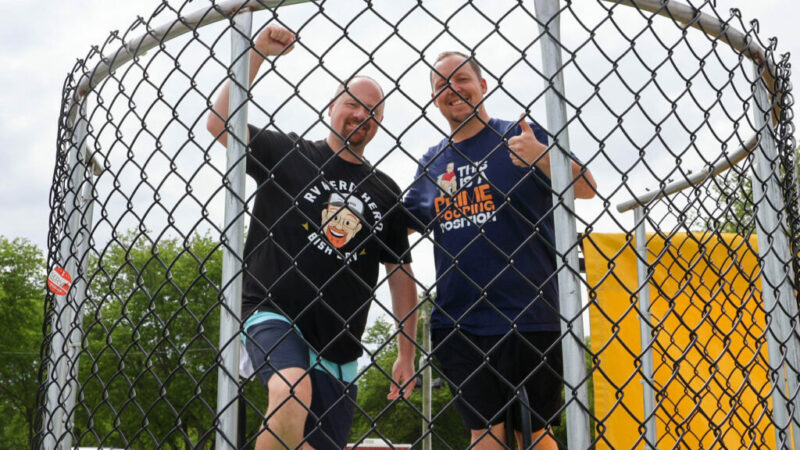Descendent of Platt Trailers Shares Company’s RV History – RVBusiness – Breaking RV Industry News
EDITOR’S NOTE: If anyone thinks they may have a Platt Trailer or would like more information, contact Harold Eichorn on Facebook—he started a Platt Trail-A-Home Facebook group or by email at [email protected].
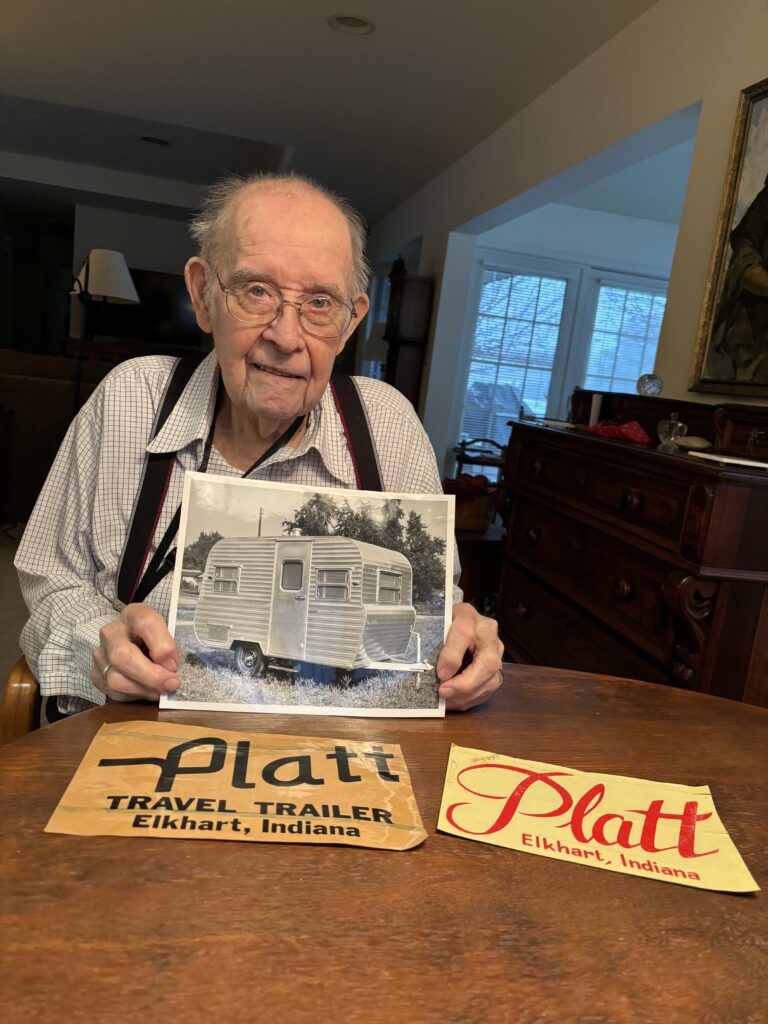
Not too many seem to remember Platt Trailers but Harold D. Platt Jr. does, as his grandfather, Oliver W. Platt, started the company — that they claim to be the first RV manufacturer in Elkhart County in 1934.
Harold, who turned 90 last July, shared that his grandfather worked for New York Central railroad and lost his arm in an accident in 1929. He had two sons, Harold D. Platt (Harold Jr’s father and a 1975 RV/MH Hall of Fame inductee) and Eldon. He said he never heard why his grandfather wanted to start an RV business, but he knew the owners of a company in Osceola, Ind., called Doloretta Manufacturing that made cabinets and card tables and. they believe, concession trailers.
“One of my grandfather’s best interests was quality — he bought Doloretta because it made fine furniture,” Harold said. “It wasn’t a big company.”
They operated Platt Trailers at the Osceola location for a year in 1934 and then in 1935 moved the Platt Trailer business to Elkhart to the corner of McDonald and Richmond Streets where they continued to operate from 1935-1961. It was a multi-level building of about 44,000 square feet. The Doloretta Manufacturing portion of the building became the cabinet shop. Charlie Chester was their main cabinet builder.
“My grandfather was the first manufacturer in Elkhart — he initiated almost everything that’s being done today,” Platt said.
His grandfather passed away in 1939 and his father took over the business. The early trailers were 13-15 feet and later 17-18 feet and had a living room, kitchen and bedroom. His father and grandfather put together the first bathroom in the trailer. There was a toilet with running water in the Platt trailers in the 1930s and later they added a bathtub and shower.
Platt said they manufactured about 6,000 custom units total — about 100-125 units a year. “Platt Trailers were renowned as being excellent products,” he said.
“Father was very active from the very start in the development of the whole industry — he spent more time helping other companies when he probably should have been devoted to his own company. He developed a dealer network, and he was the centerpiece for what would develop into MHA (Motor Home Manufacturing Association) and RVIA (Recreational Vehicle Industry Association) and shows,” he said.
Harold recalled in the 1930s when he was 5 or 6 years old being at what may have been the very first RV show in the area just over the Michigan line. His dad connected with a couple of RV manufacturers in Michigan, and they got together with their whole families and put on an RV show.
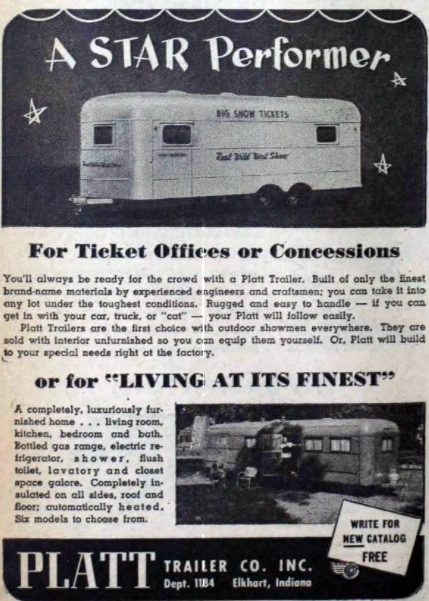
“We were in a big grassy field—they put up signs and we had a little show in an open field — probably over a weekend. There were 8-10 RV manufactures — the very first RV show—and they brought people in to see them,” he recalled.
Harold said his first job when he was 7 or 8 years old was picking up screws and nails off the floor that employees dropped, and he’d also sweep the production floors. He pointed out that there were no suppliers back then, so they had to manufacture everything.
“Today, there’s a lot of RV manufacturers assembling in the plant with components brought in as parts. Back then, we didn’t have a supplier network. We’d bring in lumber and steel and tires and axles, purchasing the raw materials, and we manufactured and assembled everything,” he said. “There was true manufacturing going on in that building. Schult (Homes) was the same.”
Schult Homes (now Clayton Homes) started shortly after Platt Trailers — within a year, Harold thought. Wilbur Schult started the company that, after his death, was purchased by the Wells family. Schult mainly manufactured mobile homes while Platt manufactured mobile homes, RVs and different types of trailers.
Harold said both his grandfather and his father highly valued quality and, he said, “One downfall of my dad’s was his interest in custom work and high quality — he’d take pride in the fact that no two units on the production line were the same — every one was a custom order. Today they run units in batches,” he said, adding, “That’s a better way to make money.”
He said the first chassis frame shop in the 1930s was in their Quonset hut and, while the building that housed Platt Trailers was recently knocked down, the Quonset hut is still there.
“The 1935 version of MORryde,” Harold Eichorn, Harold Platt’s grandson said.
When asked who some of the other earlier RV manufacturers were right after Platt and Schult, he mentioned Wells Cargo and later Richardson in the 40’s and Dick Klinger in Wakarusa, Ind., who started Holiday Rambler in the early 1950’s. He also mentioned Kropf Industries.
Mike Greene at the RV/MH Hall of Fame and Museum said he didn’t really know who came right after Platt and Schult, but he said the oldest manufacturer still in operation was Kropf Industries in Goshen, Ind.
Harold shared that other manufacturers looked to his dad for help and respected him and he was very generous to them.
“Other manufacturers, when they started, they didn’t have all the tools, so they’d come and borrow tools at night when the plant closed. One day I was working late, and a guy walked in and wanted to borrow a weighted roller to hold down linoleum. ‘Your dad said I could borrow it,’ he told me. That happened a lot,” he recalled.
WAR TIME
“During WWII from 1941-1945, Platt Trailers built mobile homes for the military bases,” Harold said, as did the other companies in the area. “Father was on the war production board and made lots of trips to DC to secure supplies – that sustained the industry, otherwise it would’ve been wiped out because materials were scarce. Dad had to petition for the needs of Elkhart by his position on the war production board.”
He said at the end of the war another uncle, Phil Lilly, came to work at Platt and he was very good at engineering.
Platt also supplied trailers to the DEW line (Distant Early Warning) in the Arctic — the missile defense warning system. They’d ship the trailers by rail car and when they got to their destination, they’d put the trailers on skis and towed them to where they were going to be.
“They’re still up there in use!” he said, adding one unit might be used as a kitchen, another unit as the recreational room, etc. They all had specific purposes.
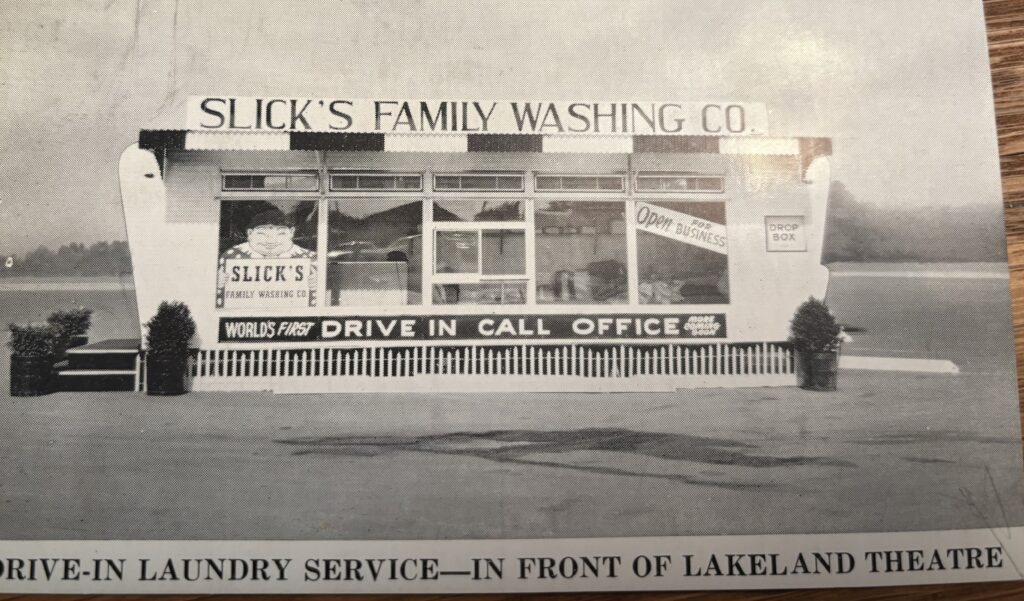
Platt built many units to do a specific job, not just as homes or campers. Platt was the first manufacturer to build specialty trailers like those used as branches for a large retail laundromat in Ft. Wayne, Ind., for Slicks Family Washing Company — they built about 100 units for them starting in 1955.
Harold graduated from Elkhart High School in 1951 and went down to Indiana University for four years and then served in the ROTC for two years. When Harold went to college, his father gave him a 38-foot mobile home Platt Trail-A-Home — “It was truly a house on wheels” – and he drove it down to IU.
In 1956, when he was home for a while, their purchasing agent was taking him home one night and said to him, “Hotie (his nickname) I want to buy the business.” So, Harold asked his dad if he wanted to sell it to him since they knew he’d take care of it, but his father didn’t want to sell it and two years later it closed down.
That happened while Harold Jr. was gone in 1958. He came home to find all the employees had been let go but all the tools and supplies were there, so he asked his father what he was going to do, and did he mind if he jumped in and got it restarted?
So, Harold Jr. got the company restarted, hired people and started from scratch – but the dedicated employees they had before who were like family were no longer available. However, they got some dealers back and started making the smaller “canned hams” that could be pulled with a little car.
He said the Trail-A-Homes were as big as 46 by 8 feet and 46 by 10 feet. Harold also recalled and showed a letter talking about the first RV show in Elkhart at Northside Gym in 1959. They had his Pierce-Arrow hooked up to a Platt travel trailer up front and he said a couple of other manufacturers grumbled about all the attention it was getting out front.
He mentioned that his grandfather also had a fox farm where he sold furs, and Harold Jr. brought plumbing and electricity out there with the idea of making an RV park out of it with room for 100 units. But only a couple came out so that idea was abandoned, and the land sold. His Uncle Phil had also custom-designed a boat with trailer home — the first of its kind. They described it as a trailer to house the boat with a boat ramp along with a travel trailer. “That was like an early version of a toy hauler,” he said.
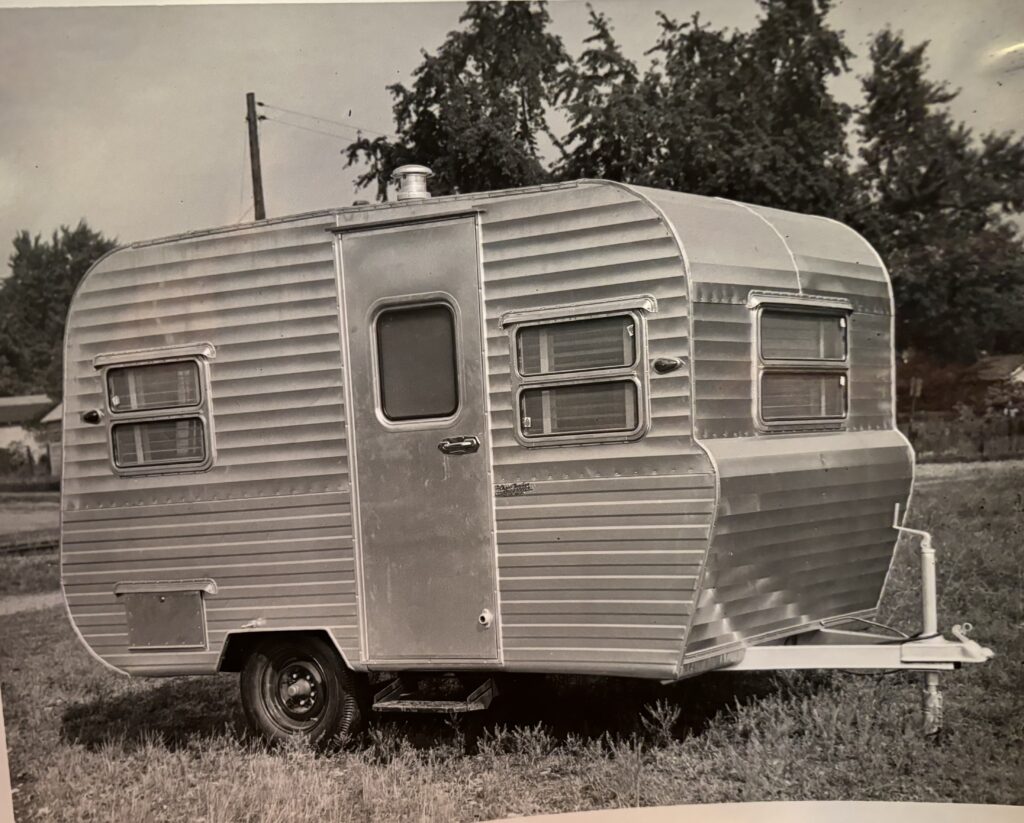
When the company went out of business for good in 1960-1961, a lot of the records were just dumped. But Harold did have some records at his home in Goshen. His grandson, Harold Eichorn – the 4th generation – and his wife Jessica have been interested in knowing more. They found a 51-foot Platt trailer on Facebook and the owner, after hearing they were family, gave the trailer to them if they went to Washington state to get it. They surprised their grandfather with it, who told them it was likely he had worked on that trailer because it was made in the timeframe when he was working in the factory learning everything about manufacturing the trailers. They then found original documentation on that particular trailer.
Eichorn was able to help another owner in California identify his trailer by advising him to look at the bottom of a drawer where the unit number would be written in red marker.
Eichorn wants to create an online presence where they can share some of the records, photos and documents that they have and communicate with other owners. And to let people know, “Even though the company closed in the 1960’s, the family is still alive and still here in Elkhart County.”
Platt said he was glad that the true history was now being told about the importance of his family’s business that played such an important part in the first decades of the RV industry in Elkhart County, not just for their sake but for the industry and the area.
Author’s Note: Many of the sources found online credit Schult Homes as being the first in the county but one source, a book written by former curator of the RV/MH Hall of Fame Museum Al Hasselbar titled “RV Capital of the World—a Fun-Filled Indiana History” does credit Platt Trailers as being the first manufacturer, while Schult may have been the first to sell trailers in Elkhart County. Schult also concentrated on mobile homes while Platt made mobile homes as well as all types of trailers. Both companies played a crucial role in the development of what is now known as the RV Capital of the World.


